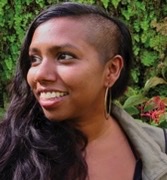Faculty Profile: Aurora Masum-Javed
Contact
The Words: Macalester's English Student NewsletterSenior Newsletter Editors:
Birdie Keller '25
Callisto Martinez '26
Jizelle Villegas '26
Associate Newsletter Editors:
Ahlaam Abdulwali '25
Sarah Tachau '27
By Zoë Roos Scheuerman ’24
Professor Aurora Masum-Javed (she/her) is one of the English department’s new faculty members this year, and she has quickly become a familiar, friendly face around the department. This month, The Words reached out to Aurora with some questions, which she very kindly answered, so that the English community could learn a bit more about her.
ZRS: Where are you from, and how did you get into writing?
AMJ: A few years ago, I was helping my mom clear out her garage-boxes we’d held onto state after state, decade after decade. Under the battered board games and school binders, I found a faded purple poster covered in dried macaroni. In one corner, in large lop-sided letters: “I WILL BE A RITER.” I don’t remember the kindergarten version of myself well, but she knew something that took adult-me a long time to learn. I’ve always wanted this life. I just didn’t know it was possible.

In high school, we only read novels written by writers of color for one semester. In college, I learned the history of Bangladesh from a white professor who told me Islam and democracy were inherently at odds. I became a public school teacher because I thought I could offer what I had not been given: the truth. But the truth is messy, layered, dangerous. The US education system prefers order, compliance, answers. I became a writer so I could move closer to the truth, so I could live in the questions.
ZRS: What do you like to explore in your writing, and why?
AMJ: I start from what I do not know, what I cannot grasp–I start from questions that feel bigger than any possible truths that might fill them.
ZRS: What are your fall and spring classes about?
AMJ: This semester, I’m teaching a class on the poetics of “The Body & The State” (What is The Body? What is The State? How can language represent either?) Next semester, I’ll be teaching a class on “How We Remember” (How do we hold memory on a page when it is constantly shifting, receding, disappearing? What forms make space for the forgotten?) It is from the wisdom and curiosity of my students that I learn what writing can do in the world. It is beside them that I become the person I long to be.